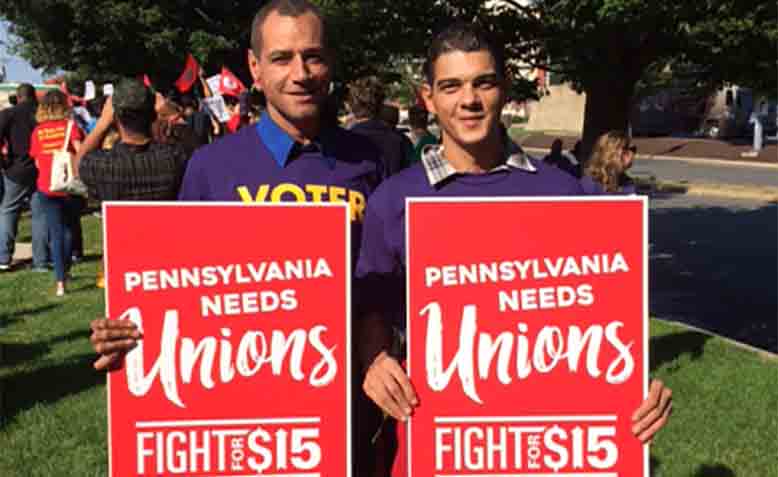 Workers, Angel and Louis out on US Labor Day 2017. Photo: Des Freedman
Workers, Angel and Louis out on US Labor Day 2017. Photo: Des Freedman
Care workers and fast-food workers came together in South Philadephia on US Labor Day
What do we want? FIFTEEN! When do we want it? NOW. If we don’t get it, SHUT IT DOWN.
We work, we sweat, put fifteen on our cheque
Hold the burgers, hold the fries, make our wages supersize
Those were just some of the chants at a protest outside a McDonalds in South Philadelphia, organized by the Fight for 15 campaign that’s backed by the Service Employees International Union (SEIU). This is part of the international movement against poverty pay in the hospitality and care industries and campaigners here are demanding a minimum of $15 per hour, up from the current $7.25. The protest was held on the morning of Labor Day, the holiday designed to commemorate the role of trade unions in the US.
For too long, however, Labor Day hasn’t had too much to celebrate. Union membership has fallen from 20 per cent of the US workforce in 1980 to just under 11 percent today. While just over a third of public sector workers are unionised, only 6 per cent of private sector workers are organized and the ironically named ‘right to work’ states which militate against union membership continue to thrive.
Yet years of wage stagnation and growing inequality have crystallized anger that takes many forms: from the scapegoating of migrant workers (one of Trump’s preferred messages) to campaigns for fair pay that have led to several cities and states ramping up the minimum wage. Indeed, the election of Trump has galvanized social justice movements and reignited the demand for a living wage.

At the Philly rally, care workers and fast-food employees came together to chant and tell harrowing stories of their working lives and their often pitiful pay.
Angel and Louis, two Latino care workers told me that
We’re here to make sure that home-workers have a united voice and come together and be recognized as workers and get the benefits we need to live day by day. And we’re growing in numbers.
One young McDonalds worker, Zahra, spoke passionately about the campaign.
I make $7.25 an hour. I’m out here today because we need unions. We can’t make 15 dollars an hour without a union. Being young, trying to make it out on your own, and then having to come to work and not being treated with respect. It’s crazy. We shouldn’t have to be out here talking about this.
Another McDonald’s worker backed her up:
I got two small kids who definitely need more. It’s not about me, it’s about them. I need medical insurance, paid sick leave, paid vacations. I work hard. McDonald’s has been putting us down for a long time. It’s the second-largest corporation in the country. And they just don’t want to pay their workers though we know that they can afford to pay their workers.
Helen Gym, a citywide councilor for Philadelphia, argued that
This isn’t just about economic justice but about the future of this country. I’m standing here for all the workers fighting for a decent living wage. This next Congressional session is going to be about tax cuts for the wealthiest people in America. I tell you this; this is not an economic crisis that we’re in, this is a man-made vision, a robbery, a theft of the American people. We have a big fight ahead.
The appetite for militancy and for labor rights reflects the findings of a new report on the benefits of union membership in the US. Researchers at the Economic Policy Institute argue that the 16 million people organized in unions make them ‘one of the largest institutions in America’. Unions are essential because they raise wages, protect safety and provide a voice for all workers. Unions also reflect the diversity of the American workplace: some two-thirds of all members are women and/or people of colour and membership has expanded across the service industries: from dental hygienists and security guards to delivery drivers and contract workers in Silicon Valley.
Unions are certainly in a minority but, fuelled by the excesses of corporate capitalism and the racism of the Trump administration, they are likely to play an important role in the growing resistance. Of course, this depends on whether they’re able to express instincts for unity and militancy and not retreat into bureaucratic defensiveness and inertia. This will be all the more crucial given the recent announcement by the Trump administration that it intends to scrap DACA – the programme that has allowed some 800,000 undocumented children to remain in the US – a decision that is likely to be focus of huge opposition in the coming weeks.
Back outside the McDonalds in Philadelphia, the speeches had finished but the energy had not dissipated. There was time for a march (several times) round the restaurant. The idea was to encircle one of the bastions of global capitalism – even if only for a short time.

